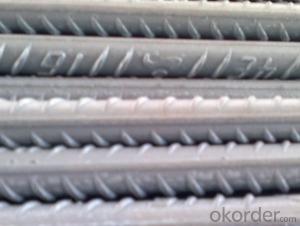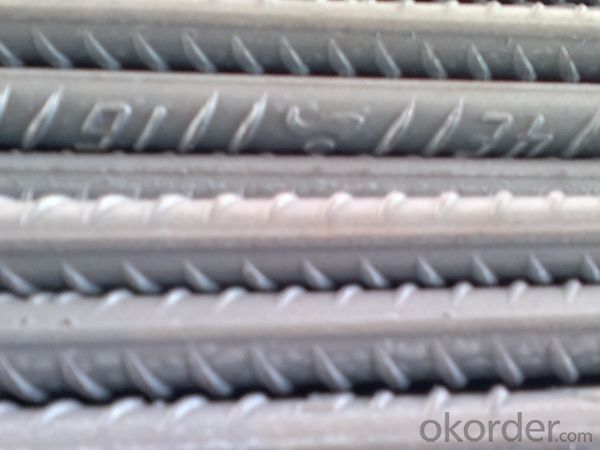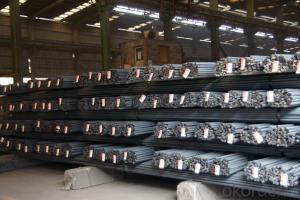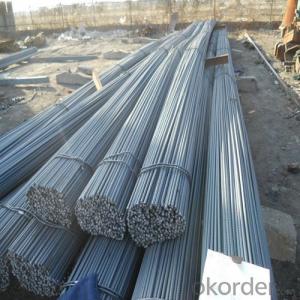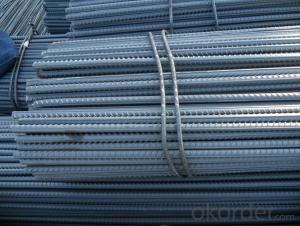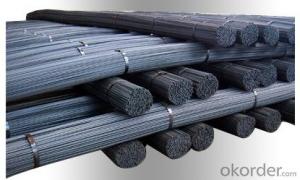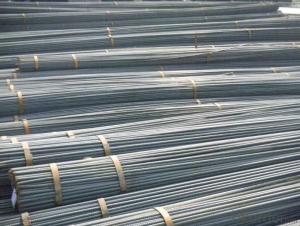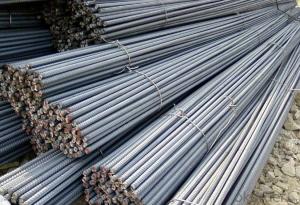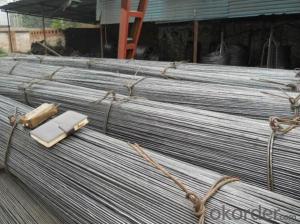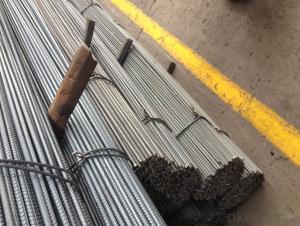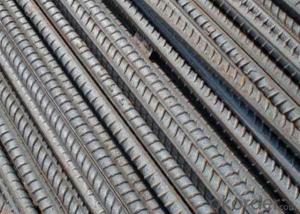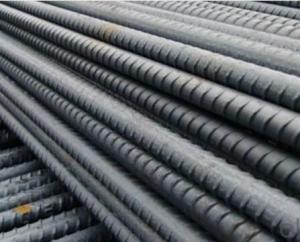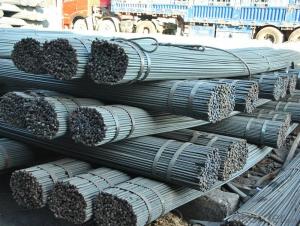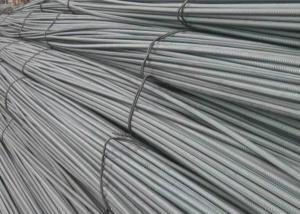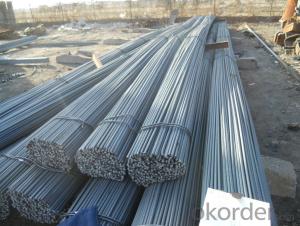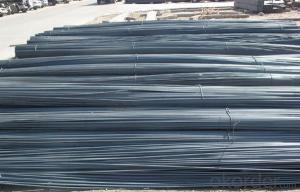Hot Rolled Deformed Steel Rebars for Construction HRB400,500
- Loading Port:
- Tianjin
- Payment Terms:
- TT or LC
- Min Order Qty:
- 25 m.t.
- Supply Capability:
- 200000 m.t./month
OKorder Service Pledge
OKorder Financial Service
You Might Also Like
Product Description:
OKorder is offering Hot Rolled Deformed Steel Rebars for Construction HRB400,500 at great prices with worldwide shipping. Our supplier is a world-class manufacturer of steel, with our products utilized the world over. OKorder annually supplies products to European, North American and Asian markets. We provide quotations within 24 hours of receiving an inquiry and guarantee competitive prices.
Product Applications:
Hot Rolled Deformed Steel Rebars for Construction HRB400,500 are ideal for structural applications and are widely used in the construction of buildings and bridges, and the manufacturing, petrochemical, and transportation industries. Deformed bar is widely used in buildings, bridges, roads and other engineering construction. Big to highways, railways, bridges, culverts, tunnels, public facilities such as flood control, dam, small to housing construction, beam, column, wall and the foundation of the plate, deformed bar is an integral structure material.
Product Advantages:
OKorder's Steel I-Beams are durable, strong, and resist corrosion.
Main Product Features:
· Premium quality
· Prompt delivery & seaworthy packing (30 days after receiving deposit)
· Corrosion resistance
· Can be recycled and reused
· Mill test certification
· Professional Service
· Competitive pricing
Specifications of Hot Rolled Deformed Steel Rebars for Construction HRB400,500
Standard | GB UK USA | HRB335 HRB400 HRB500 G460B, B500A, B500B,B500C GR40, GR60 | |
Diameter | 6mm,8mm,10mm,12mm,14mm,16mm,18mm,20mm, 22mm,25mm,28mm,32mm,36mm,40mm,50mm | ||
Length | 6M, 9M,12M or as required | ||
Payment term | TT or L/C | ||
Trade terms | FOB, CFR, CIF | ||
Application | Building, construction | ||
Each bundle weight | 2-3MT, or as required | ||
Type | Hot rolled steel rebar | ||
Brand name | OKORDER | ||
Theoretical weight and section area of each diameter as below for your information:
Diameter(mm) | Section area (mm²) | Mass(kg/m) | Weight of 12m (kg) | Pcs/ton |
6 | 28.27 | 0.222 | 2.664 | 375.38 |
8 | 50.27 | 0.395 | 4.74 | 210.97 |
10 | 78.54 | 0.617 | 7.404 | 135.06 |
12 | 113.1 | 0.888 | 10.656 | 93.84 |
14 | 153.9 | 1.21 | 14.52 | 68.87 |
16 | 201.1 | 1.58 | 18.96 | 52.74 |
18 | 254.5 | 2.00 | 24 | 41.67 |
20 | 314.2 | 2.47 | 29.64 | 33.74 |
22 | 380.1 | 2.98 | 35.76 | 27.96 |
25 | 490.9 | 3.85 | 46.2 | 21.65 |
28 | 615.8 | 4.83 | 57.96 | 17.25 |
32 | 804.2 | 6.31 | 75.72 | 13.21 |
36 | 1018 | 7.99 | 98.88 | 10.43 |
40 | 1257 | 9.87 | 118.44 | 8.44 |
50 | 1964 | 15.42 | 185.04 | 5.40 |
Deformed Steel Rebar in warehouse
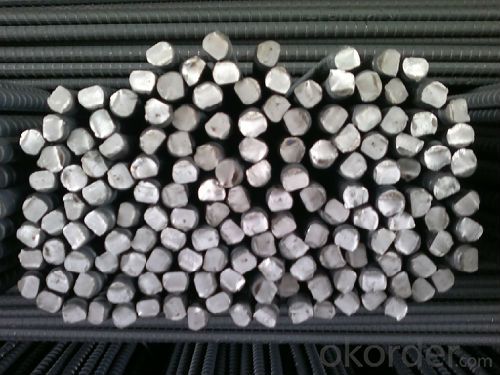
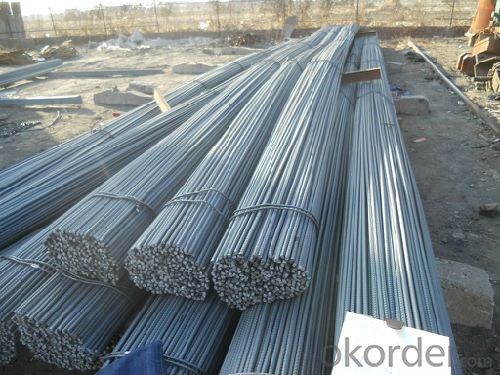
Packaging & Delivery of Hot Rolled Deformed Steel Rebars for Construction HRB400,500
Packaging Detail: products are packed in bundle and then shipped by container or bulk vessel, deformed bar is usually naked strapping delivery, when storing, please pay attention to moisture proof. The performance of rust will produce adverse effect.
Delivery Detail: within 45 days after received advanced payment or LC.
Label: to be specified by customer, generally, each bundle has 1-2 labels
Note:
1. Our products are produced according to national standard (GB), if not, supply according to national standards (GB) or agreement as customer required.
2. Other Grade and Standard Deformed Steel Bar we can supply:
Grade: GR40/GR60, G460B/B500A/B500B/B500C,BST500S
Standard: ASTM, BS, DIN
The Minimum Order Quantity of these products is high, and need to be confirmed.
3. We can not only supply Deformed Steel Bar; if you need anything about building materials, please contact us for further information.
4. Please send us your detail specifications when inquire. We will reply to you as soon as possible. We sincerely hope we can establish a long stable business relationship.
FAQ:
Q1: What is the normal tolerance of Hot Rolled Deformed Steel Rebars for Construction HRB400,500?
A2: Normally 3%-5%, but we can also produce the goods according to the customers' requests.
Q2: How do we guarantee the quality of Hot Rolled Deformed Steel Rebars for Construction HRB400,500?
A2: We have established an advanced quality management system which conducts strict quality tests at every step, from raw materials to the final product. At the same time, we provide extensive follow-up service assurances as required.
Q3: How soon can we receive the product after purchase?
A3: Within three days of placing an order, we will begin production. The specific shipping date is dependent upon international and government factors, but is typically 7 to 10 workdays.
- Q: How are steel rebars used in parking structures?
- Steel rebars are used in parking structures to reinforce and strengthen the concrete, increasing its load-bearing capacity and durability. They are typically placed in the concrete to resist tension and prevent cracking, ensuring the structure's stability and longevity.
- Q: What is the role of steel rebars in minimizing the risk of structural collapse?
- Steel rebars are of utmost importance in reducing the likelihood of structural collapse in buildings and other construction projects. These rebars, which are commonly referred to as reinforcing bars, are manufactured from steel and are employed to strengthen concrete structures. They augment the concrete's strength and durability, making it more resilient against various forces and decreasing the chances of collapse. One of the primary causes of structural failure lies in the incapability of a building or structure to withstand the forces it encounters. These forces encompass the weight of the structure itself, as well as external forces like wind, earthquakes, and even human activities. Without adequate reinforcement, concrete alone may not have the capacity to endure these forces, thus leading to structural collapse. Strategically positioned within the concrete, steel rebars bolster its tensile strength. While concrete boasts great strength in compression, it is relatively weak in tension. By incorporating steel rebars, the concrete becomes significantly more resistant to tension and can better endure bending and cracking. This reinforcement enables the structure to distribute loads more evenly and prevents localized failures. Furthermore, steel rebars also serve to control and restrict the spread of cracks within the concrete. In the event of crack formation, the rebars function as a barrier, holding the concrete together and preventing further cracking and potential collapse. This role is particularly crucial in regions prone to seismic activities, as the rebars can aid in dissipating and absorbing the energy generated by an earthquake. Aside from their structural function, steel rebars also contribute to the longevity and durability of the concrete structure. By reinforcing the concrete, the rebars help to impede corrosion and degradation caused by environmental factors such as moisture and chemicals. This ensures the integrity and stability of the structure over an extended period, diminishing the risk of collapse due to deterioration. To summarize, the role of steel rebars in minimizing the risk of structural collapse is pivotal. They enhance the strength and durability of the concrete, heightening its ability to withstand various forces and averting failure. Through reinforcing the concrete, rebars distribute loads, regulate crack propagation, and contribute to the structure's longevity, ultimately guaranteeing the safety and stability of buildings and other construction projects.
- Q: What is the impact of steel rebars on the overall carbon footprint of a building?
- Steel rebars have a significant impact on the overall carbon footprint of a building. The production of steel involves high energy consumption and releases a substantial amount of greenhouse gas emissions, primarily carbon dioxide. The extraction and processing of iron ore, as well as the manufacturing and transportation of steel rebars, contribute to the carbon footprint of a building. The carbon footprint of steel rebars is further influenced by the extent of the rebar usage in the building. The more steel rebars used, the higher the carbon footprint will be. The size and complexity of the structure, as well as the specific design requirements, will determine the quantity of steel rebars needed. However, it is important to note that steel rebars are an essential component of reinforced concrete, which is widely used in construction due to its strength and durability. Reinforced concrete provides structural integrity and ensures the safety and longevity of a building. So, while steel rebars contribute to the carbon footprint, they also play a crucial role in constructing safe and resilient structures. To mitigate the carbon footprint associated with steel rebars, several strategies can be employed. One approach is to use recycled steel rebars, which significantly reduces the energy consumption and emissions associated with steel production. Additionally, optimizing the design and construction process can help minimize the overall amount of steel required, thereby reducing the carbon footprint. Moreover, alternative materials such as fiber-reinforced polymers (FRPs) are being developed as substitutes for steel rebars. FRPs have lower carbon footprints, as they are made from materials such as fiberglass or carbon fiber, which have lower emissions during production. However, the use of FRPs is still limited, and further research and development are needed to increase their viability as a mainstream alternative. In conclusion, steel rebars have a notable impact on the overall carbon footprint of a building due to the energy-intensive production process and emissions associated with their extraction, manufacturing, and transportation. However, their crucial role in providing structural integrity and durability must be considered. Efforts to reduce the carbon footprint of steel rebars include using recycled materials, optimizing designs, and exploring alternative materials such as FRPs. Ultimately, a holistic approach that considers both the environmental impact and the structural requirements of a building is necessary to minimize the carbon footprint associated with steel rebars.
- Q: How are steel rebars used in tunnel construction?
- Steel rebars are commonly used in tunnel construction to reinforce the concrete structures, providing strength and durability to the tunnel. These rebars are placed within the concrete to resist tensile forces and prevent cracks or failures. They help to ensure the tunnel's stability and enhance its ability to withstand various loads, such as traffic or ground pressure.
- Q: What are the guidelines for ensuring proper concrete cover over steel rebars?
- Proper concrete cover over steel rebars is crucial for the long-term durability and performance of reinforced concrete structures. Here are some guidelines to ensure the correct concrete cover over steel rebars: 1. Follow building codes and specifications: Building codes and specifications provide minimum requirements for concrete cover over steel rebars. These guidelines are established to ensure structural integrity, fire resistance, and resistance to corrosion. It is essential to consult and adhere to the applicable building codes and specifications for the specific project. 2. Determine the required concrete cover: The required concrete cover depends on various factors, such as environmental conditions, exposure to aggressive agents, structural design, and reinforcement type. Structural engineers typically determine the required concrete cover based on these factors to ensure the rebars are adequately protected. 3. Use appropriate concrete mix design: The concrete mix design should be carefully selected to achieve the desired strength, durability, and workability. The mix design should consider factors like the quality and size of aggregates, cement content, water-to-cement ratio, and use of additives or admixtures. Using a well-designed concrete mix will help ensure proper bonding and adequate protection of the steel rebars. 4. Maintain proper construction practices: During construction, it is crucial to maintain proper practices to ensure the correct concrete cover over steel rebars. This includes using proper formwork and reinforcement placement techniques, ensuring proper concrete placement, compaction, and curing. The rebars should be adequately positioned and securely tied to maintain the required cover and prevent displacement during concrete pouring. 5. Inspect and monitor during construction: Regular inspections and monitoring at various stages of construction are essential to ensure compliance with the required concrete cover. This includes checking reinforcement placement, cover thickness, and overall quality of the concrete. Any deviations from the specified requirements should be addressed and rectified promptly. 6. Protect against corrosion: Adequate concrete cover over steel rebars plays a significant role in protecting against corrosion. However, additional measures such as using corrosion-resistant rebars, applying epoxy coatings, or using corrosion inhibitors can further enhance the durability and longevity of the reinforced concrete structure. 7. Document and maintain records: It is important to document the construction process, including the reinforcement placement, concrete cover thickness, and any deviations or modifications made during construction. This documentation will serve as a valuable resource for future reference, maintenance, and repairs. By following these guidelines, proper concrete cover over steel rebars can be ensured, resulting in durable and structurally sound reinforced concrete structures. It is always recommended to consult with structural engineers and construction professionals for specific project requirements and to ensure compliance with local building codes and regulations.
- Q: How are steel rebars protected against extreme weather conditions?
- Various methods are employed to safeguard steel rebars from extreme weather conditions. One prevalent technique involves the application of protective coatings, which act as a barrier between the rebar and the environment, preventing exposure to moisture, oxygen, and other corrosive elements. These coatings can consist of epoxy, zinc, or concrete-based materials. Another method of protection entails the incorporation of corrosion inhibitors into the concrete during the mixing process. These inhibitors create a protective layer on the rebar's surface, hindering the infiltration of moisture and corrosive substances. Furthermore, ensuring an adequate thickness of concrete cover is imperative for shielding rebars against harsh weather elements. This cover acts as a physical barrier, impeding the access of moisture and corrosive agents to the steel. Moreover, design considerations are taken into account to protect rebars from extreme weather conditions. In areas prone to severe weather or high humidity, engineers may specify the use of stainless steel rebars or epoxy-coated rebars due to their enhanced corrosion resistance properties. Regular maintenance and inspections are also crucial for the long-term protection of rebars against extreme weather conditions. By conducting inspections, any signs of corrosion or damage can be identified promptly, enabling timely repairs and preventative measures. In conclusion, the protection of steel rebars from extreme weather conditions is achieved through the application of protective coatings, the incorporation of corrosion inhibitors, the provision of proper concrete cover, and the consideration of design factors. Regular maintenance and inspections are vital for ensuring their ongoing protection.
- Q: Can steel rebars be used in structures with high electrical conductivity requirements?
- No, steel rebars cannot be used in structures with high electrical conductivity requirements as steel is a poor conductor of electricity.
- Q: How do steel rebars affect the overall seismic performance of a structure?
- Steel rebars play a crucial role in enhancing the overall seismic performance of a structure. Seismic events such as earthquakes exert dynamic forces on buildings, causing them to vibrate and potentially collapse. However, the inclusion of steel rebars in concrete structures significantly improves their ability to withstand such forces and ensures the safety of the occupants. Firstly, steel rebars enhance the structural integrity of a building. By reinforcing the concrete, they increase its tensile strength, as concrete alone is weak in tension. During an earthquake, the rebars help distribute the dynamic forces throughout the structure, preventing the concentration of stress on specific areas. This redistribution of forces minimizes the risk of localized failures and ensures that the structure remains stable. Furthermore, steel rebars increase the ductility of the structure. Ductility refers to a material's ability to deform under stress without fracturing. During an earthquake, buildings experience significant lateral movements and deformations. Steel rebars, due to their high ductility, can elongate and stretch without breaking, absorbing and dissipating the seismic energy. This property allows the structure to withstand larger ground motions and reduces the possibility of sudden collapse. Additionally, steel rebars improve the overall resilience of a structure. Resilience refers to the ability of a building to quickly recover its functionality after an earthquake. By reinforcing the concrete, steel rebars contribute to the post-earthquake repairability of the structure. They ensure that the building maintains its load-carrying capacity even after suffering damages, which reduces downtime and allows for faster recovery. Moreover, steel rebars provide a warning sign of potential structural issues. During an earthquake, cracks may appear in the concrete, indicating areas of stress concentration. These cracks are often visible around the rebars, serving as an early indication of structural vulnerability. This visual warning allows for timely inspection and repair, preventing further damage and ensuring the long-term safety of the building. In conclusion, steel rebars play a vital role in enhancing the overall seismic performance of a structure. Their inclusion in concrete significantly improves the structural integrity, increases ductility, enhances resilience, and provides visual warnings of potential issues. By reinforcing the concrete, steel rebars ensure that buildings can withstand seismic forces, reducing the risk of collapse and ensuring the safety of occupants during earthquakes.
- Q: Can steel rebars be used in wastewater treatment plants?
- Yes, steel rebars can be used in wastewater treatment plants. Steel rebars are commonly used as reinforcement for concrete structures, including those found in wastewater treatment plants. The rebars provide strength and durability to the structures, ensuring they can withstand the harsh environments and corrosive nature of wastewater. However, it is important to select the appropriate grade of steel rebars that are resistant to corrosion caused by the chemicals present in wastewater.
- Q: Cast-in-place with 10 mm reinforcement, a good layer or 8 mm double layer? Why?
- In general, 8 of the bilayer is better than 10 of the single layer.(1) the reinforcement of cast-in-place slab shall be designed according to the principle of fine reinforcement.(2) the cast-in-place slab shall be controlled with a minimum reinforcement ratio greater than 0.25%.
Send your message to us
Hot Rolled Deformed Steel Rebars for Construction HRB400,500
- Loading Port:
- Tianjin
- Payment Terms:
- TT or LC
- Min Order Qty:
- 25 m.t.
- Supply Capability:
- 200000 m.t./month
OKorder Service Pledge
OKorder Financial Service
Similar products
Hot products
Hot Searches
Related keywords
